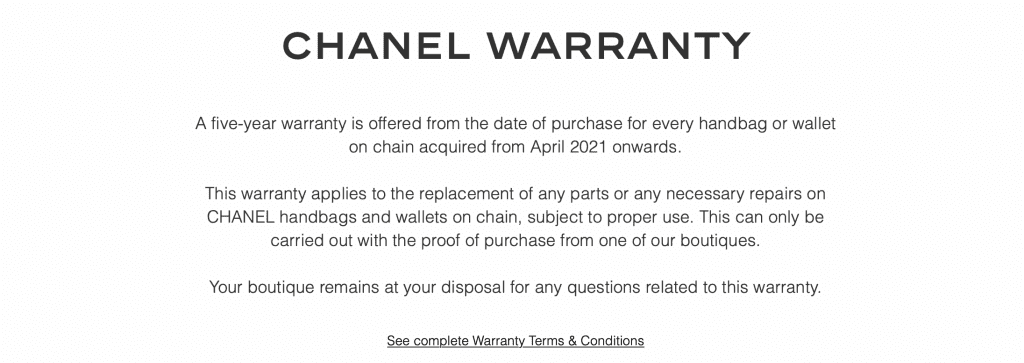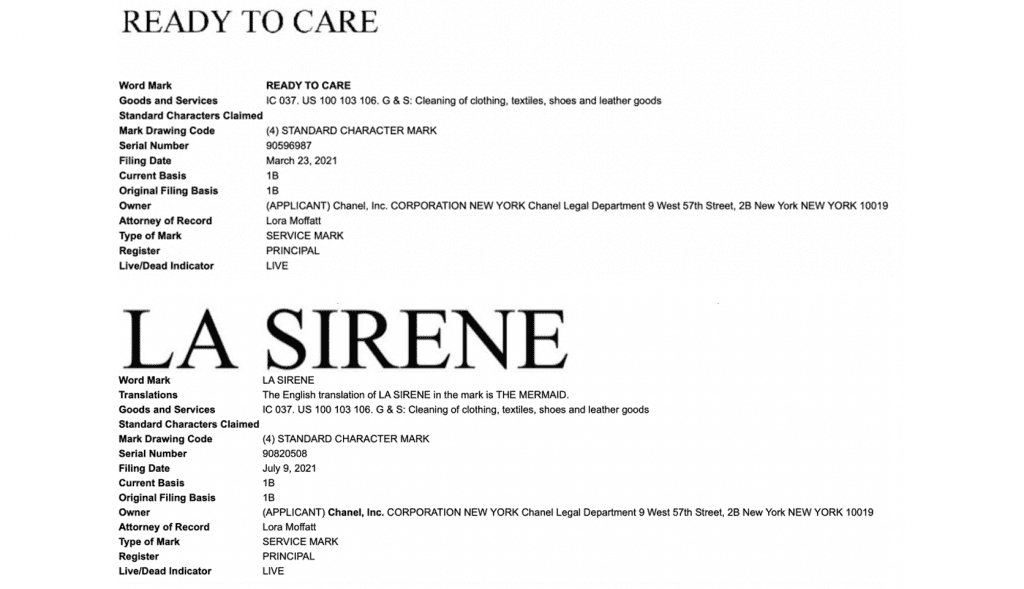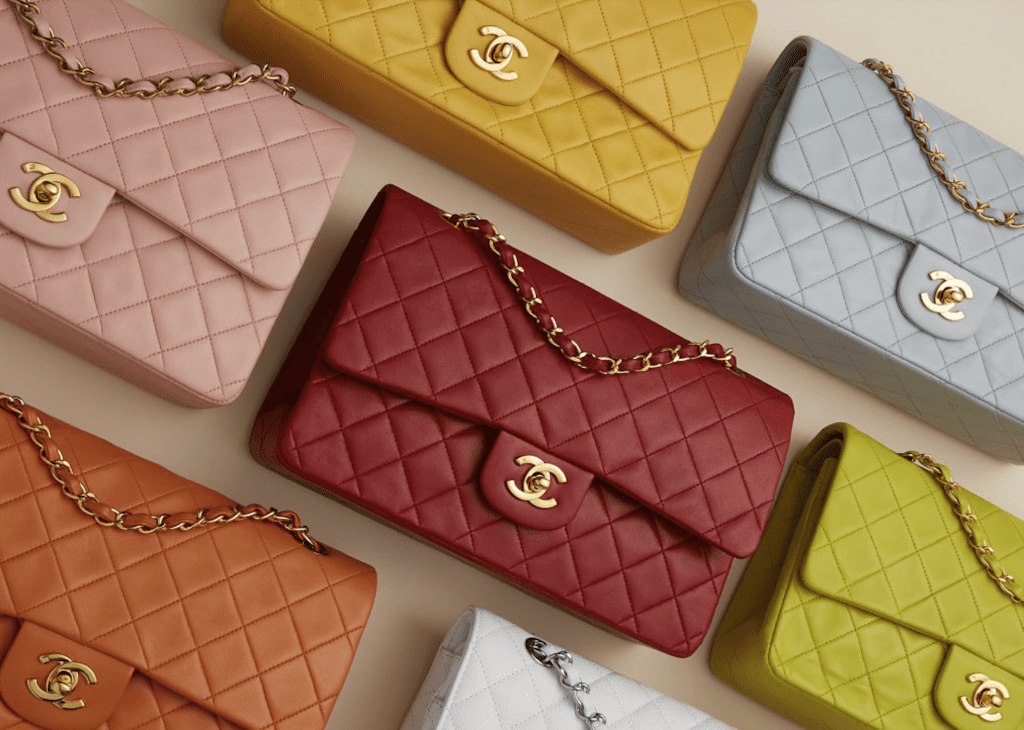Over the past year or so, Chanel has been filing a handful of interesting trademark applications for registration in the U.S. (and beyond). In November 2020, for instance, it filed to register “Chanel & Moi.” A month later, it filed new applications for registration for its famous word mark and double “C” logo, and then in March, it lodged an application for “Ready to Care.” Still yet, this month, it filed an application for “La Sirene.” It is not necessarily the marks, themselves, that are especially striking in these instances, especially given that Chanel already enjoys robust rights in its name and logo across an array of classes of goods and services. Instead, it is the new class of services in which Chanel intends to use these marks that is interesting: “Cleaning and repair of fashion and fashion accessories.”
It turns out that as multi-million-dollar NFTs, MSCHF’s Satan Shoes (and the short-lived lawsuit over them), and brands’ first quarter revenue results were dominating headlines this spring, Chanel was somewhat quietly rolling out a couple of new initiatives. “The first one, entitled CHANEL Warranty, pledges an exclusive 5-year guarantee for all CHANEL handbags and CHANEL wallets on chain” acquired from Chanel’s boutiques beginning in April 2021, the brand first stated in the new “Chanel & moi” section of its website a few months ago.
In addition to the new warranty, Chanel also unveiled “CHANEL Restoring Care,” which it describes as “an array of unique care services [that] will exist in each of [its] boutiques across the world” to repair and rejuvenate certain Chanel products. “This commitment to every CHANEL creation will engage the House’s singular ecosystem that emphasizes its artisans who specialize in restoration and repairs,” according to Chanel, which further asserts that the artisans’ “expertise and dedication showcase a seasoned savoir-faire that is deftly achieved in the CHANEL ateliers that are fabled for having every material and element at hand.”

The services being offered up by Chanel, which has maintained a “Fashion After Sales” program for years, are not the first of their kind. In fact, they are among the latest developments in a string of recent efforts by luxury brands to tap into the growing attention among – and demands from – consumers when it comes to sustainability and circularity in fashion, particularly in the wake of the COVID-19 pandemic. SCMP’s Melissa Twigg states that “increased awareness about the environmental impact of the fashion industry combined with the slowing down of life since the start of the coronavirus has made customers re-evaluate their relationship with the shoes, handbags, coats and dresses they used to love but which are in need of a repair or a resize.” And brands know this.
“Keen to show their credentials” on the sustainability front, Twigg notes that “many luxury brands are now offering customers the opportunity to fix their past purchases, often free of charge or at a nominal cost.” Repair services – which have long been offered by the likes of Hermès for its top-of-the-line handbags and high-end watchmakers, and have been adopted more recently by brands like Brunello Cucinelli and Mark Cross, and even His Royal Highness the Prince of Wales – “have become far more interesting to young customers – even those who can afford something new,” Anita Balchandani, a partner at McKinsey specializing in luxury fashion, told SCMP. Hence, the more recent adoption of efforts by brands across varying positions in the fashion and luxury industries to extend the life of products and close the loop when it comes to their ownership.
By offering up these services, especially as they continue to raise their prices (quite aggressively in some cases), Chanel and other luxury brands are essentially providing consumers with additional value with their purchases, a move that stands to engender goodwill for the brands, and strengthen their bonds with exiting customers, while helping them to attract new ones. This is significant in light of the fact that companies, such as Chanel, Hermès, and co., attempt to limit the sale of their products exclusively by way of authorized distributors. And yet, the reality is that consumers are increasingly able to get their hands on these coveted luxury goods – sometimes, in unused, with-tags condition – thanks to the burgeoning resale market. This puts the impetus on brands to find ways to lure in consumers, including by offering up benefits that unauthorized retailers cannot.

Still yet, beyond potentially serving as a way to entice consumers to purchase products through authorized channels as opposed to from resale counterparts, the increasing emphasis by luxury brands on in-house repairs is a way for some of them to further hold on to as much control over the market for their products as possible.
As Chanel asserts on its website, “Only the House of CHANEL is able to restore its creations while guaranteeing their integrity.” This appears as though it may be a nod to the rise in unaffiliated third parties that are looking to tap into consumers’ interest in repairing pre-owned products by offering repair services, as well. A quick Google search reveals an array of unaffiliated entities that specifically market themselves are capable of repairing Chanel goods. It is also a reminder of a claim that Chanel made in the lawsuit that it has waged against The RealReal, in which Chanel asserted that “only products purchased directly from Chanel and its authorized retailers can be certain to be” – and thus, be advertised as – “genuine and authentic.” That argument has (unsurprisingly) faced pushback, and chances are, Chanel’s seemingly strong stance when it comes to repairs very well may engender some strong feelings, as well.
Either way, as we noted this spring, issues regarding repairs and modifications have begun to arise, particularly in instances when trademark-bearing products are significantly modified by third parties and then subsequently sold without the original manufacturer’s authorization, and they will likely continue to come up as “the lifespan of fashion products is being stretched as pre-owned, refurbished, repaired and rental business models continue to evolve.”














